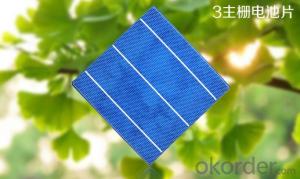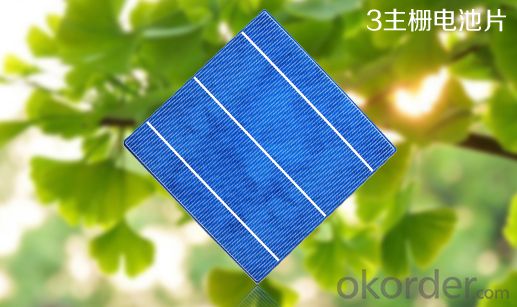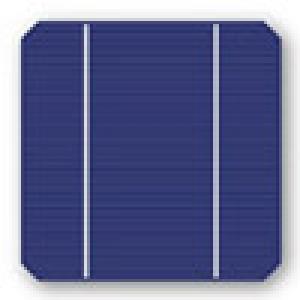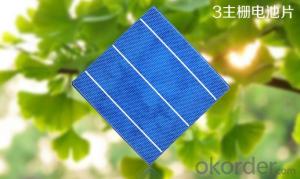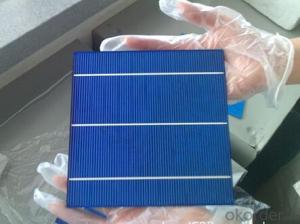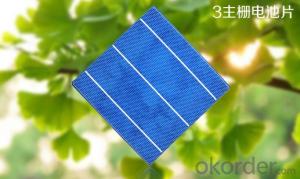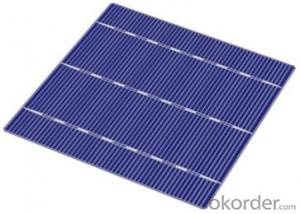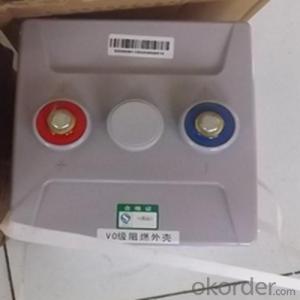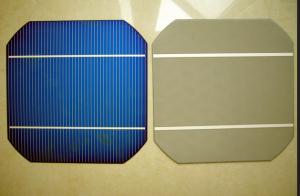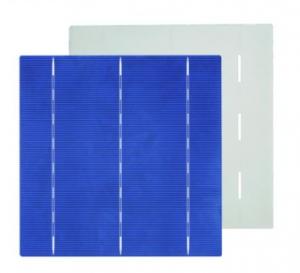Underwater Solar Cells PV Poly 3BB Line Cells
- Loading Port:
- China Main Port
- Payment Terms:
- TT OR LC
- Min Order Qty:
- -
- Supply Capability:
- -
OKorder Service Pledge
OKorder Financial Service
You Might Also Like
Our solar has series of world's leading PV production equipments, including German RENA’s ultrasonic cleaning machine, USA TVSTAR’s return tube diffusion furnace, German Centro therm’s PECVD equipment and Italy BACCINI’s silk screen printing machine,etc. First class equipments and optimizing configuration, makes the high quality. We’ve already got ISO9001-2008 international quality system certification, TUV, CE, UL, ISO14001:2004, OHSAS18001:2007 and my other international certifications. We are strictly accordance with the quality management system and management process operation, ensusre the control quality target coverage every process.
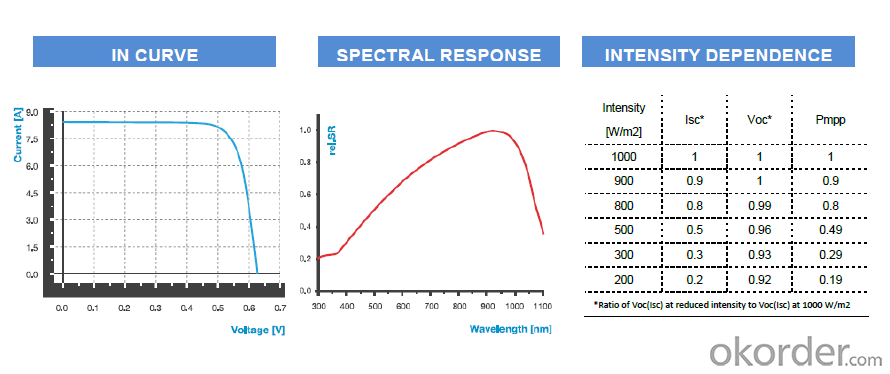
- Q: Can solar cells be used on windows?
- Yes, solar cells can be used on windows.
- Q: How do solar cells perform in areas with high levels of humidity?
- Solar cells generally perform slightly less efficiently in areas with high levels of humidity. The moisture in the air can reduce the amount of sunlight reaching the cells and increase the chances of dust and dirt accumulation on the surface, both of which can hinder their performance. However, technological advancements have been made to mitigate these effects, and solar cells can still generate significant electricity even in humid regions.
- Q: How do solar cells handle electrical noise or interference?
- Solar cells do not directly handle electrical noise or interference. However, solar cell systems often include components such as inverters or power conditioning units that help mitigate electrical noise or interference by converting the direct current (DC) produced by the solar cells into alternating current (AC) that is more resistant to noise. Additionally, proper grounding and shielding techniques can be employed to minimize any potential interference from external sources.
- Q: How do solar cells handle hail or other physical damage?
- Solar cells are designed to be durable and withstand various weather conditions, including hail or physical damage. The cells are typically made of tempered glass, which is highly resistant to impact. Additionally, solar panels are tested and certified to meet certain industry standards for hail resistance. In the event of severe damage, such as a shattered panel, individual cells can be replaced without affecting the overall performance of the solar system.
- Q: Can solar cells be used for powering sports stadiums?
- Yes, solar cells can definitely be used to power sports stadiums. Solar panels can be installed on the rooftops of stadiums or in nearby areas where they can harness sunlight and convert it into electricity. This renewable energy source can help reduce carbon emissions, lower energy costs, and provide a sustainable power solution for sports stadiums.
- Q: How do solar cells perform in humid climates?
- Solar cells can still perform well in humid climates, although their efficiency might be slightly reduced compared to dry climates. The moisture in the air can cause some scattering of sunlight and create a film of water on the surface of the solar panels, which can decrease their efficiency. However, advancements in solar cell technology have been made to mitigate the effects of humidity, such as using anti-reflective coatings and self-cleaning mechanisms. Overall, solar cells can still generate electricity effectively in humid climates.
- Q: Can solar cells be used in indoor applications?
- Yes, solar cells can be used in indoor applications. While solar cells primarily generate electricity from sunlight, they can also convert artificial light sources, such as fluorescent or LED lighting, into electricity. This makes them suitable for powering various indoor devices and applications, including calculators, wireless sensors, and even indoor lighting systems.
- Q: Are solar cells affected by temperature changes?
- Yes, solar cells are affected by temperature changes. Higher temperatures can cause a decrease in the efficiency of solar cells, as the increase in temperature can lead to an increase in resistance within the cells, resulting in reduced power output. Conversely, lower temperatures can improve the performance of solar cells, increasing their efficiency.
- Q: Can solar cells be used in marine applications?
- Yes, solar cells can be used in marine applications. They are commonly used in various marine applications such as powering navigation lights, communication systems, and electrical equipment on boats, yachts, and other marine vessels. Additionally, solar panels can also be used to charge batteries on marine vehicles, providing a sustainable and renewable source of energy.
- Q: Can solar cells be used in power plants?
- Yes, solar cells can be used in power plants. Solar power plants, also known as solar farms or solar parks, use arrays of solar panels or solar cells to convert sunlight into electricity on a large scale. These solar power plants can generate significant amounts of renewable energy and contribute to reducing greenhouse gas emissions.
Send your message to us
Underwater Solar Cells PV Poly 3BB Line Cells
- Loading Port:
- China Main Port
- Payment Terms:
- TT OR LC
- Min Order Qty:
- -
- Supply Capability:
- -
OKorder Service Pledge
OKorder Financial Service
Similar products
Hot products
Hot Searches
Related keywords
